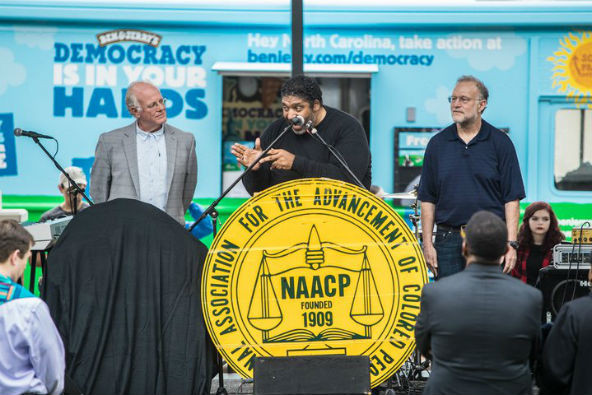When I relocated to the United States 11 years ago, the company I worked for explicitly told me to avoid bringing up race and racial issues during business transactions at all costs. Unfortunately, it was indicative of how most businesses would rather not get involved in social justice issues.
When I became the CEO of Ben & Jerry’s, I knew the business was not like others. While most businesses avoid serious issues for fear of losing customers, Ben & Jerry’s had a history of running toward controversy rather than away from it. Whether supporting same-sex marriage and LGBTQ rights, or initiatives to combat global warming or a ban on Muslims in the United States, the company has remained in the scrum. Its cofounder Ben Cohen says forward thinking, progressive shared values around equity, equality, and the environment create the strongest bond we can have with our fans. We take inspiration from that foundation and practice, forging forward to take stands on challenging social problems.

Our company is mission-focused and values-led. Ben & Jerry’s has long been a proponent for equality and social justice, and were grateful to be recognized by the Martin Luther King Junior Center for Non-Violent Social Change in the United States in 2012. But until recently, we had never intentionally addressed systemic and institutional racism.
 Ben & Jerry’s launches Democracy Is In Your Hands, a campaign with Rev. Barber focused on voting and empowering communities of color ahead of the 2016 election.
Ben & Jerry’s launches Democracy Is In Your Hands, a campaign with Rev. Barber focused on voting and empowering communities of color ahead of the 2016 election.
Throughout 2015, we hosted a group of advisors from organizations with expertise in race. With their counsel, we built a knowledge base, listened and learned, and found out what we could do to raise awareness and take action against racial injustice. At the end of the year, Ben & Jerry’s Foundation led a trip to Greensboro, North Carolina—a city with a rich history of social action against segregation—and met with nongovernmental organizations (NGOs) and advocates to develop a strategy. This conversation led to a campaign focused on voting and empowering communities of color in Greensboro and across North Carolina—a politically mixed, “purple” state. Instead of running a traditional corporate marketing campaign, we wanted experts on the ground—including the Beloved Community Center, Bennett College, and the International Civil Rights Center and Museum—to direct the effort. These experts determined how and where they could create the most impact using the power of our products and corporate voice. The result was the Empower Mint campaign, which ultimately succeeded in registering 7,000 people to vote.
During this process, we learned a lot about related issues—including institutional apathy toward communities of color, gerrymandering that still hasn’t been resolved on the national scale, and systematic efforts to suppress black voting. We also awakened to the idea that racism is not just a black or brown problem. It’s a universal problem that we must all work together to collectively address, irrespective of color.
With the support of our board of directors and other partners, we have since deepened our understanding of the complexities of racism. Most importantly, we have begun to define the role that Ben & Jerry’s can play as a values-led business, and regularly use our voice and brand to increase awareness about racial justice. For example, we’ve published dozens of informative articles on this topic—including “How Can I Be Less Prejudiced?” “School Segregation Is Still a Thing,” “Why Black Lives Matter,” and “Seven Ways We Know Systemic Racism Is Real”—on our blog, which has received more than two million views.
We’ve also used our products—specifically, our ice cream—to increase awareness. In 2017, we launched the “One Sweet World” flavor. A portion of the sales supported a refugee campaign for thoughtful and deliberate relocation of refugees in the European Union. The campaign garnered more than 17,000 petitions submitted in the United Kingdom, Germany, and Sweden during the presentation of a European Union proposal, dubbed the European Resettlement Bill, to address the skyrocketing refugee population, which grew from 14,000 in 2016 to 1.19 million just a few years later. The European Parliament, Commission, and Council continue to meet to hammer out a compromise that will meet the needs of the political parties and EU residents, as well as institute meaningful change to provide safety and a workable outcome for refugees.
More recently, we used the same flavor to bring attention to the Poor People’s Campaign in the United States, which aims to create an equitable world without the evils of racism, militarism, and poverty. These are all challenges businesses can help address. Both cofounders spoke at the campaign’s kickoff event at the iconic Howard Theatre in December, 2017, and then again at a gathering in Washington, DC, this past April. In May, we joined the campaign’s official 40 Days of Action—which calls for protests, marches, and other efforts to promote economic and social justice—in Washington, DC, our hometown of Burlington, Vermont, and a handful of other cities around the United States to show our support. One of the leaders in the movement, Liz Theo-Harris, also joined an annual, internal Ben & Jerry’s meeting in January 2018 to raise awareness among our staff. Quoting Dr. King, she said the goal was to build an army to advocate for the poor and lead non-violent, sustained, massive action.
All that being said, here’s the truth: We aren’t experts in racial justice. We are experts in making ice cream. At the same time, we are committed to tackling issues that negatively affect communities of color. We hold fast to the idea that, in partnership with these communities, we must try to make a difference. But we recognize that simple talk isn’t enough to create the transformative change that we espouse in our progressive values statement. We are now in the process of making sure we are walking the talk on a variety of levels, for example, embedding our values into hiring practices so that they are more inclusive and engaging with minority-owned businesses that provide ingredients for our products. We have a long and challenging road ahead of us, but as a business, we believe we have the power to both influence change and create significant impact. We encourage others to join us.
Support SSIR’s coverage of cross-sector solutions to global challenges.
Help us further the reach of innovative ideas. Donate today.
Read more stories by Jostein Solheim.

